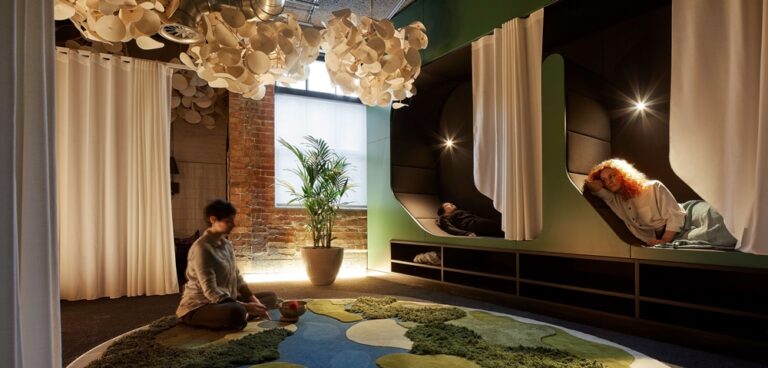Excessive noise in the workplace is taking a disproportionate toll on neurodiverse employees, according to a new study of 2,000 UK business professionals by Oscar Acoustics, specialists in architectural acoustic finishes. The research highlights how overlooked sound issues are quietly undermining inclusivity, focus, and productivity in modern office environments.
As businesses like Amazon and JP Morgan push forward with office returns, there’s growing scrutiny on how inclusive these environments truly are. While a lack of acoustic comfort is a widespread concern, its impact on individuals with neurodiverse conditions—including ADHD, autism, dyslexia, and dyspraxia—is especially stark.
What’s sounding the alarm is that the majority of these individuals describe their workplace as noisy: 71% of those with dyspraxia, 67% with ADHD, 66% with dyslexia, and 62% with autism, according to the survey of nearly 450 British neurodiverse people.
Over 15% of the UK population is estimated to be neurodiverse, and diagnoses are on the rise, particularly among young adults, driven by better awareness, broader diagnostic criteria, improved mental health access, and reduced stigma. However, acoustics often remain an afterthought in workplace design, leading to poor performance, health issues, retention, and recruitment outcomes for employers.
A growing barrier to inclusion
Oscar Acoustics’ research highlights how the one-size-fits-all office is no longer viable. More than 2 in 5 employees surveyed with autism (42%) reported that excess noise in the office directly impacts the quality of their work. A similar number (40%) said they need more quiet spaces for focused tasks. For other conditions, the findings were equally severe: 41% of people with ADHD, 33% with dyspraxia, and 40% with dyslexia reported struggling with concentration due to noise.
Daily distractions, like video calls at desks and background conversations, are particularly disruptive to neurodivergent individuals. However, simple design adjustments could have a profound effect: one in four employees surveyed with ADHD (26%) and dyspraxia (25%) say access to more quiet working areas would improve their productivity.
Designing for difference
These insights come at a time when leading architectural firms are rethinking their approach to inclusive workspaces. Rob Smith, Director at tp bennett, explains: “It’s been an essential topic for us for several years. We’ve worked with clients where it’s been central to the brief, shaping everything from spatial layouts to material choices. More recently, we’ve had direct feedback on projects where certain finishes were reconsidered after clients pointed out they may not be the most suitable for specific areas of the business. It’s about pushing the industry to think more critically about inclusive design.”
Yet, there’s no single mindset guiding design evolution. Graeme Winestone, Associate Director at GPAD, says: “It’s a process. We often challenge the brief as we go, initiating conversations around key issues like inclusive design, but ultimately, it depends on the company. Some are open to change; others remain set in their ways.”
Smith adds: “There needs to be more logic in how offices are designed, ensuring a seamless transition from quieter zones to vibrant, high-energy areas. And when people do find themselves in those busier environments, there should be easily accessible refuge spaces. This is where we can truly leverage acoustics and lighting to create retreats that offer relief when the noise becomes overwhelming.”
The blueprint for a high-performing, inclusive office
Derek Clements-Croome, Emeritus Professor at the University of Reading, an expert in intelligent buildings and workplace health, outlines a five-point action plan for organisations ready to embrace inclusive design:
- Acoustic Zoning – Introduce designated zones for quiet work alongside collaborative areas. Advanced sound-absorbing finishes such as Oscar Acoustics’ SonaSpray range reduce reverberation, creating harmonious environments.
- Natural Elements – Integrate biophilic design principles such as greenery, daylight access, and outdoor areas to improve concentration and mood.
- Varied Workspaces – Offer a balanced mix of spaces to suit different activities and personalities: focus pods, open areas, informal lounges, and meeting zones.
- Cognitive Breaks – Encourage movement, provide micro-break areas, and establish wellness rooms to reduce fatigue and enhance creativity.
- Wellness-Driven Policies – Support staff with flexible workstations, ergonomic design, and access to wellness programs that address both mental and physical health.
Ben Hancock, Managing Director of Oscar Acoustics, ends with: “Poor acoustics and subpar equipment don’t just hurt productivity, they exclude. Neurodiverse employees often face the biggest challenges in noisy, overstimulating environments. Smart investment in acoustic design and quality tools isn’t a luxury, it’s a necessity for an inclusive, high-performing workplace where everyone can thrive together.”
To find out more about Oscar Acoustics’ study, download their 2025 Whitepaper ‘Shaping Spaces for The Great Return to the Office’ here.

